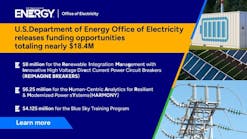Ask utility leaders who they trust for accurate and well-presented market research on smart grid technologies and they'll probably say Newton-Evans Research Co., hands down. Chuck Newton and his crew have been setting the standard for business-to-business survey research since 1978. Even the U.S. Department of Energy quotes the company's numbers in several reports.
Newton-Evans Research is a world leader in the technical marketing research of electric power delivery use of computers, communications and control systems. Newton has personally provided services, including consulting and teaching, in more than 38 countries. Are you curious about how many substations or how many line miles of transmission are on planet Earth? Ask Newton. Not only does he know, he's visited many of them. He figures he's traveled 3.1 million miles by air and spent nine months of his life sitting in a commercial airliner.
So, what does Newton do on vacation? He travels the world, of course. He's been to at least 95 countries. And, maybe because he lives near Baltimore Harbor, he loves the sea, so much so that he's been on 17 ocean liner cruises with his wife, Marilyn, who also enjoys roaming the globe.
The combination of international travel and multicultural consulting experience brings a valuable world perspective to Newton-Evans clients.
Still, Newton, the professional economist and researcher, may have the world as his playground, but Newton, the man, has his heart in his neighborhood community. When asked about personal interests and achievements, he gets pretty excited about his work in the Lazarus Caucus, the faith-based service organization providing resources and services to Baltimore County's Westside Shelter for Men. Lazarus Caucus (www.lazaruscaucus.org) provides clothing and meals, but more than that, the organization has a remarkably successful program of training the homeless to be employable. It's sort of a “hand-up not a hand-out” approach.
Newton serves on the Lazarus Caucus board of directors, and he particularly enjoys putting together the personal care kits to give to shelter guests. “When I retire, if I ever do,” he says, “I'll probably be a counselor with Lazarus Caucus.”
Newton has always been fascinated by industry, partially, he thinks, because he grew up in Detroit. In high school, his favorite subject was geography. So, no wonder he loves visiting industrial plants all over the world. Over the course of his career, Newton has visited more than 300 industrial plants.
“I always look forward to factory tours and visits, and have ever since I made my first visit to an automobile production plant,” said Newton. “In college, my favorite course was industrial economics, taught by the world-famous ‘steel priest’ William T. Hogan, S.J., who founded Fordham University's highly regarded Industrial Economics Research Institute.”
While a student at Fordham University in New York, Newton occasionally played hooky to attend sessions at the United Nations Headquarters. That generated an interest that continues to this day in his membership activities in the Baltimore Council on Foreign Affairs.
Graduating with a degree in economics, Newton was promptly drafted and sent to Vietnam as an NCO in charge of a Field Artillery Fire Direction Center. He was one of the first personnel trained in the use of Field Artillery Digital Automatic Computer, an artillery application of industrial supervisory control and data acquisition (SCADA), which soon would modernize electric delivery systems. It was literally a baptism by fire into the world of computer and control acronyms that would later populate many Newton-Evans research reports.
After leaving the Army, Newton went on to work for Control Data Corp. Then GE recruited him to be applications product manager of remote processing, the first generation of what, decades later, would be called cloud computing. Along the way, he earned his MBA with a major in marketing from Loyola.
With that background, in 1978, Newton and IT research industry colleague Ron Evans started the firm Newton-Evans Research. Evans soon left for other opportunities, but Newton kept the name.
An early contract with Motorola studied the use of radio for utility distribution automation. The fledgling company became known for its IT and communications studies prior to its focus on electric power. The firm began publishing its three flagship market reports: EMS/SCADA/DMS, Protection and Control, and Substation Automation.
When asked what makes his boutique-sized company so valuable to major suppliers and utilities around the world, Newton replied, “We talk with utility operations and engineering people who know what they need. Then we effectively and clearly communicate that information to developers. We're a bridge between buyers and sellers.”
A bridge built on the integrity and character of Chuck Newton.

